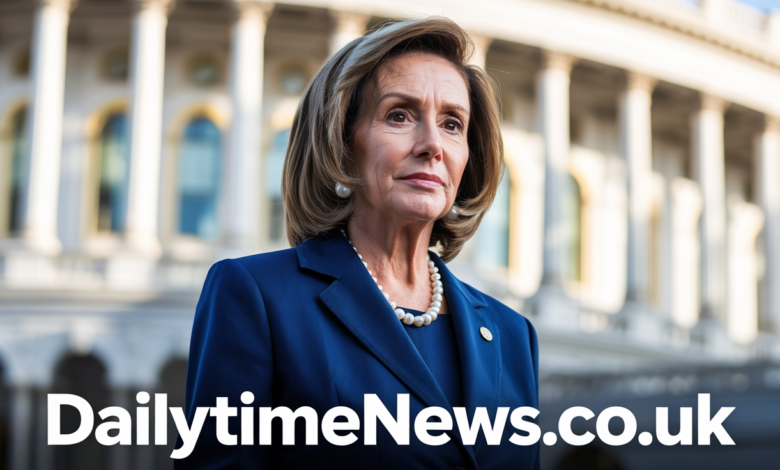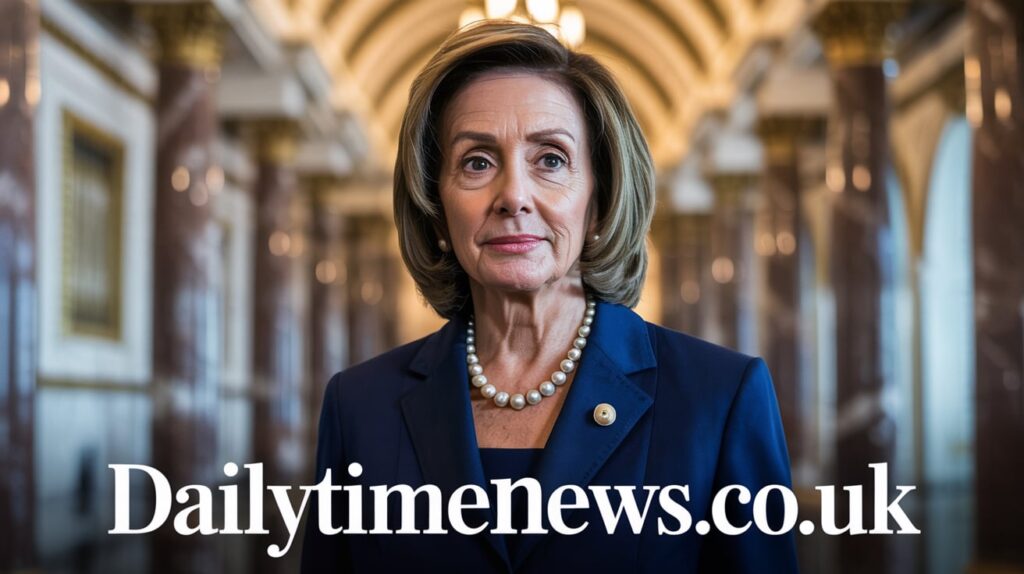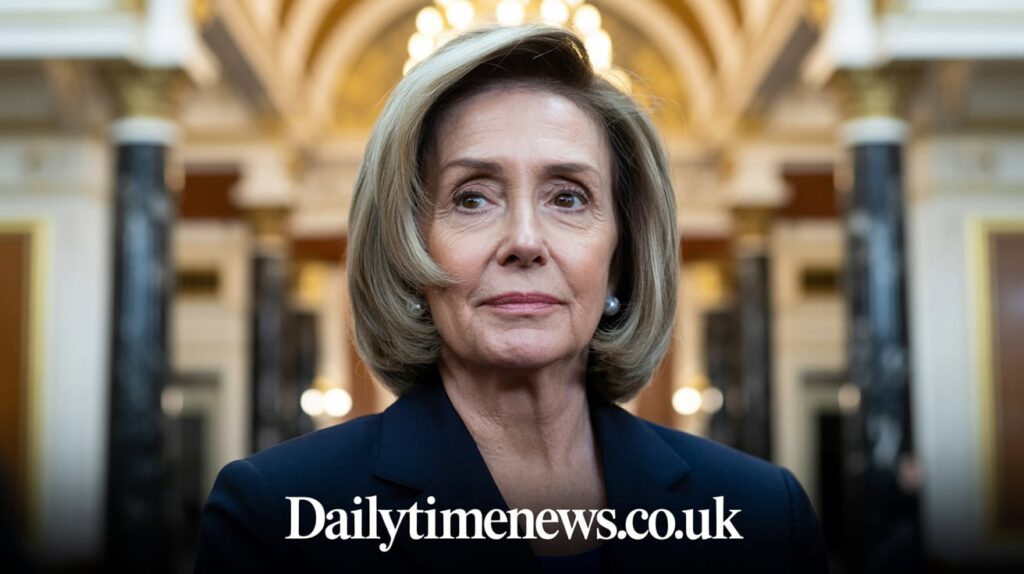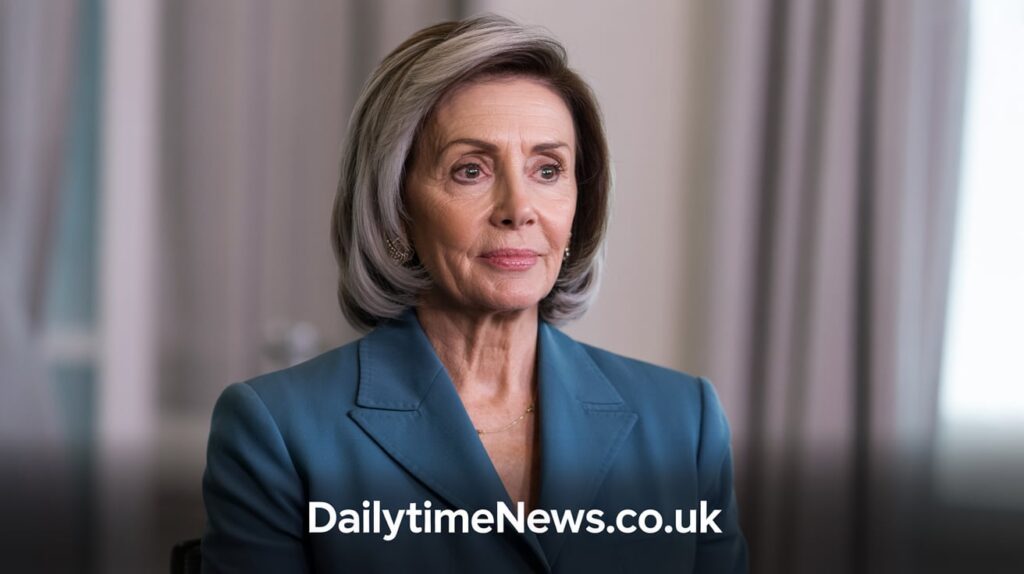Nancy Pelosi Age: Powerful Career Defying Time

Introduction
When you think about longevity in American politics, few names stand out quite like Nancy Pelosi. At 84 years old, she remains one of the most recognizable and influential figures in Washington. Nancy Pelosi age often becomes a topic of conversation, not just because of the number itself, but because of what she’s accomplished throughout her extraordinary career.
Born on March 26, 1940, Pelosi has witnessed and participated in some of the most significant moments in American history. From growing up in a political family to becoming the first female Speaker of the House, her journey reflects determination, strategic thinking, and an unwavering commitment to public service. She’s broken barriers that many thought were impossible to shatter.
In this comprehensive guide, you’ll learn everything about Nancy Pelosi age and how it relates to her political journey. We’ll explore her early life and family background, her rise through political ranks, her historic achievements, her leadership style, the controversies she’s faced, and what the future might hold. Whether you follow politics closely or you’re just curious about this prominent figure, this article will give you the complete picture of one of America’s most enduring political leaders.
Nancy Pelosi’s Early Life and Background
Understanding Nancy Pelosi age and career means starting at the beginning. She was born Nancy Patricia D’Alesandro in Baltimore, Maryland. Politics wasn’t something she discovered later in life. It was literally in her DNA and surrounded her from day one.
Her father, Thomas D’Alesandro Jr., served as a Democratic congressman and later as Baltimore’s mayor. Her mother, Annunciata, was deeply involved in organizing Democratic women. Growing up in this environment meant political discussions at the dinner table were normal. Strategy, constituent services, and coalition building were part of everyday conversation.
Young Nancy was the only girl among six children, which taught her how to hold her own and make her voice heard. She learned early how to navigate male-dominated spaces. These childhood experiences shaped the politician she would become decades later.
The family’s Italian Catholic heritage also played a significant role. Community, family loyalty, and service to others were core values instilled from childhood. These principles would guide her throughout her political career and personal life.
Despite this political upbringing, Pelosi didn’t immediately jump into electoral politics herself. She focused first on education and family. She graduated from Trinity College in Washington, D.C., in 1962 with a degree in political science. Shortly after, she married Paul Pelosi, and they moved to New York before eventually settling in San Francisco.
The Path to Political Power
Nancy Pelosi age was already approaching 47 when she first won elected office. This might seem like a late start, but her previous years weren’t wasted. She spent decades building networks, raising money, and working behind the scenes in Democratic politics.
After moving to California in 1969, Pelosi became increasingly involved in state politics. She worked as a volunteer and organizer for the Democratic Party. Her organizational skills and ability to fundraise caught attention. She understood that political power often comes from controlling resources and building coalitions.
In 1976, she was elected as a Democratic National Committee member from California. This position gave her national exposure and connections. She chaired the California Democratic Party from 1981 to 1983. During this time, she honed her political skills and expanded her network considerably.
Her big break came in 1987 when Congressman Sala Burton was dying of cancer. Burton had represented California’s 5th congressional district and wanted Pelosi to succeed her. With Burton’s endorsement and her own fundraising prowess, Pelosi won a special election in June 1987.
At 47, she finally had her own seat at the table. What happened next would exceed everyone’s expectations, including probably her own. She didn’t just serve in Congress. She would eventually lead it.
Historic Firsts and Major Achievements
Nancy Pelosi age has never been a barrier to making history. In fact, she’s shattered multiple glass ceilings throughout her career. Her achievements stand as milestones not just for her personally, but for women in American politics.
First Female Speaker of the House
In 2007, Pelosi achieved what no woman had before. She became Speaker of the House, second in line to the presidency. This wasn’t just a symbolic victory. The Speaker holds enormous power over legislation, committee assignments, and the House agenda.
She was 66 years old when she first claimed the gavel. Many politicians would consider this a capstone achievement. For Pelosi, it was just another step in her journey. She would serve as Speaker from 2007 to 2011, then again from 2019 to 2023.
Her election as Speaker represented a breakthrough moment. Young girls could finally see a woman in one of the most powerful positions in American government. The image of her holding the Speaker’s gavel became iconic and inspiring to millions.
Legislative Accomplishments
As Speaker, Pelosi demonstrated remarkable legislative skills. She managed to pass significant legislation despite narrow majorities and intense partisan divisions. Her ability to count votes and maintain party discipline became legendary.
The Affordable Care Act (Obamacare) stands as perhaps her most significant legislative achievement. Getting this passed required incredible political skill. She had to balance competing interests within her own party while facing unified Republican opposition. The bill’s passage in 2010 fundamentally changed American healthcare.
She also helped pass major legislation on financial reform following the 2008 crisis. The Dodd-Frank Wall Street Reform Act aimed to prevent future financial disasters. Getting these reforms through Congress required navigating complex policy and political terrain.
During President Trump’s administration, she led Democratic opposition while occasionally working across the aisle on issues like infrastructure. Her relationship with Trump was famously contentious, captured in viral photos from heated White House meetings.
Impeachment Leadership
Pelosi presided over two impeachments of President Donald Trump. The first, in 2019, centered on Ukraine and abuse of power allegations. The second, in 2021, followed the January 6th Capitol attack. Both were historic and controversial.
Her decision to pursue impeachment wasn’t taken lightly. She initially resisted calls from her more progressive members. When she finally moved forward, she did so with calculated strategy. The proceedings showcased her ability to manage complex political situations under intense scrutiny.

Understanding Her Leadership Style
Nancy Pelosi age brings wisdom and experience that shapes her distinctive leadership approach. Decades in politics taught her how to navigate treacherous waters and build coalitions. Her style combines toughness with strategic flexibility.
The Iron Fist in a Velvet Glove
Colleagues describe Pelosi as tough but gracious. She can be firm when necessary but also knows when to compromise. This balance has allowed her to lead a diverse Democratic caucus with competing ideologies and priorities.
She’s known for meticulous vote counting. Before bringing legislation to the floor, she ensures she has the votes needed. This preparation prevents embarrassing defeats and wasted political capital. It’s a skill honed over decades of legislative work.
Her meetings are reportedly efficient and focused. She doesn’t waste time and expects others to be equally prepared. This business-like approach keeps things moving, especially important given the volume of work Congress handles.
Fundraising Powerhouse
One of Pelosi’s greatest strengths is fundraising. She’s raised hundreds of millions of dollars for Democratic candidates over her career. This financial support creates loyalty and gives her significant influence within the party.
Her ability to attract wealthy donors stems from decades of relationship building. She understands what motivates different supporters and tailors her appeals accordingly. This isn’t just about asking for money. It’s about building long-term partnerships.
This fundraising prowess has made her valuable to Democrats nationwide. Members who benefit from her financial support tend to support her leadership. It’s a mutually beneficial arrangement that strengthens her position.
Managing Diverse Coalitions
The Democratic Party includes everyone from moderate conservatives to Democratic Socialists. Managing this ideological diversity requires skill and patience. Pelosi has generally succeeded where others might have failed.
She listens to different factions while keeping focus on achievable goals. Progressive members might want bold action, while moderates prefer incremental change. Finding common ground requires understanding what each group truly needs versus what they simply want.
Her experience helps her spot when compromise is possible and when it isn’t. She picks battles carefully, knowing that winning small victories often beats losing big fights. This pragmatic approach frustrates some but has proven effective over time.
Controversies and Criticisms
No political career spanning decades avoids controversy. Nancy Pelosi age and long tenure mean she’s accumulated both admirers and critics. Understanding the criticisms provides a complete picture of her career and impact.
Questions About Age and Leadership
The most common criticism relates directly to Nancy Pelosi age. Critics argue that leaders in their 80s can’t effectively represent younger generations. They point to generational divides on issues like climate change, student debt, and technology regulation.
Some younger Democrats have openly called for new leadership. They argue the party needs fresh faces and new ideas. These tensions came to a head after disappointing 2022 midterm results for Democrats.
Pelosi has pushed back against age-based criticism, pointing to her continued effectiveness. She argues that experience matters and that she’s delivered results. Her supporters note that she’s mentored younger members and supported their advancement.
Wealth and Populist Criticism
Pelosi’s substantial personal wealth attracts criticism from both left and right. Her husband Paul is a successful investor and real estate developer. Their net worth is estimated at over $100 million.
Questions about stock trades by members of Congress gained attention in recent years. Critics argue that lawmakers shouldn’t profit from inside information. Pelosi initially resisted banning congressional stock trading but eventually supported restrictions.
Progressive critics argue her wealth disconnects her from working-class Americans. They question whether someone so wealthy can truly fight for economic justice. These criticisms reflect broader debates about inequality and representation.
Partisan Divisions
Republicans paint Pelosi as an extreme partisan who puts party over country. They point to impeachment proceedings and resistance to Trump administration policies. Conservative media has made her a favorite target and fundraising foil.
Some Democrats criticize her from the opposite direction. They argue she’s too willing to compromise with Republicans. Progressive members sometimes view her as an obstacle to transformative change. These tensions reflect ongoing debates about Democratic strategy and priorities.

Stepping Down as Speaker
In November 2022, after Republicans won the House majority, Nancy Pelosi age and future became a major story. She announced she would not seek a leadership position in the new Congress. After serving as Speaker or minority leader for two decades, she was stepping aside.
This decision marked a significant moment in American politics. Pelosi had been the face of House Democrats for an entire generation. Her departure opened the door for new leadership to emerge. Hakeem Jeffries became the new Democratic leader, the first Black person to lead either party in Congress.
Pelosi made clear she wasn’t retiring from Congress entirely. She would continue representing San Francisco as a rank and file member. This allowed her to remain involved while giving younger leaders room to grow. It was a graceful transition that preserved her dignity while acknowledging the need for change.
The announcement received mixed reactions. Supporters praised her legacy and accomplishments. Critics argued she should have stepped aside years earlier. Both perspectives reflected legitimate views about leadership, age, and political transition.
Her decision to stay in Congress rather than fully retire sparked some debate. Some argued complete retirement would better serve the party’s renewal. Others appreciated her willingness to continue serving her constituents in a reduced capacity.
Life Beyond the Speakership
Nancy Pelosi age hasn’t slowed her down even after stepping back from leadership. At 84, she remains active in Congress and engaged in political life. Her post-Speakership career offers lessons about aging, purpose, and transition.
Continued Congressional Service
As a regular House member, Pelosi continues representing California’s 11th congressional district. She attends votes, meets with constituents, and participates in committee work. Her experience makes her a valuable resource for younger members seeking advice.
Without leadership responsibilities, she has more flexibility in choosing her battles. She can focus on issues particularly important to her or her district. This allows for a different kind of impact than wielding the Speaker’s gavel.
Her continued presence provides institutional memory. Congress benefits from members who remember past legislative fights and can provide historical context. This knowledge helps prevent repeating mistakes and informs better decision making.
Mentorship Role
One of Pelosi’s current roles involves mentoring the next generation of Democratic leaders. She shares lessons learned from decades in politics. Her advice on strategy, fundraising, and coalition building remains valuable.
Young members seek her counsel on navigating difficult votes or constituent pressures. She’s been where they are and faced similar challenges. This mentorship helps develop future leaders while keeping her engaged and relevant.
She’s also worked to ensure more women and people of color rise in Democratic ranks. Her own barrier-breaking career inspires others to aim higher. She uses her influence to open doors that might otherwise remain closed.
Personal Life and Family
Behind the political figure is a wife, mother, and grandmother. Pelosi has been married to Paul Pelosi since 1963. They have five children and nine grandchildren. Family has always been important despite her demanding career.
The violent attack on Paul Pelosi in October 2022 was devastating. An intruder broke into their San Francisco home and assaulted him with a hammer. The attack was politically motivated and highlighted the dangers facing political families.
Pelosi has spoken about the trauma of that attack and Paul’s recovery. It reminded everyone that political rhetoric has real-world consequences. The incident also showed her resilience in continuing her duties despite personal crisis.
Comparing Political Longevity
Nancy Pelosi age places her among a group of politicians who’ve maintained influence well into their 80s. Looking at others in this category provides perspective on age and political effectiveness.
Senate Veterans
The Senate includes several octogenarians. Mitch McConnell, the Republican leader, is 82. Dianne Feinstein served until her death at 90. Bernie Sanders is 83 and remains active. These examples show that advanced age alone doesn’t disqualify effective service.
However, concerns about age have intensified in recent years. Feinstein’s final term raised questions about cognitive decline and whether colleagues should have intervened earlier. McConnell has experienced public health episodes that sparked similar concerns.
The debate isn’t whether older politicians can serve effectively. Clearly, many do. The question is how to handle situations when age genuinely impairs someone’s ability to do the job. There’s no easy answer or clear mechanism for addressing this.
Presidential Age Questions
President Joe Biden’s age has dominated political discussion. Born in 1942, he’s two years older than Pelosi. Questions about his mental acuity and physical stamina have been constant throughout his presidency.
Donald Trump, born in 1946, also faced age-related questions, though less intensely than Biden. The 2024 presidential race has refocused attention on whether there should be age limits for office. Polls show many Americans believe there should be.
This broader conversation affects how people view Nancy Pelosi age and continued service. It’s part of a national reckoning with aging leadership and generational transition. The resolution of these debates will shape American politics for years to come.
The Legacy Question
What will Nancy Pelosi’s ultimate legacy be? This question becomes more pressing as her career enters its final chapter. Several achievements seem certain to endure regardless of partisan perspective.
Breaking Gender Barriers
Pelosi’s role as the first female Speaker will always be historic. She proved women can wield political power at the highest levels. The symbolic importance of this achievement cannot be overstated.
Young women growing up during her Speakership saw possibilities their mothers and grandmothers never imagined. Representation matters, and Pelosi provided it in a role previously held exclusively by men. This impact extends beyond legislation to cultural change.
Future female Speakers will follow the path she carved. Each will build on her foundation. The first is always the hardest, facing skepticism and opposition their successors won’t experience to the same degree.
Legislative Achievements
The Affordable Care Act stands as a defining legislative accomplishment. Whatever its flaws or controversies, it fundamentally changed American healthcare. Millions gained insurance coverage who previously had none.
Her work on other major legislation, from financial reform to infrastructure, also forms part of her legacy. These weren’t easy wins. They required political skill, determination, and the ability to navigate complex legislative terrain.
Critics will dispute the merit of these policies. That’s normal in democratic politics. What’s undeniable is that she successfully moved major legislation despite intense opposition and narrow margins.
Partisan Fighter
Pelosi’s aggressive opposition to Republican policies, particularly during the Trump years, will be remembered. Supporters see principled resistance to dangerous policies. Critics see partisan obstruction.
The two impeachments of Trump will remain controversial. History’s judgment on these proceedings hasn’t been written. Pelosi’s role in them will be debated for generations.
Her relationship with Trump, captured in viral moments like her ripping up his State of the Union speech, defined an era. These images symbolize the intense polarization of American politics during this period.
What the Future Holds
At 84, Nancy Pelosi age means her time in politics is clearly finite. Yet she shows no signs of full retirement. What might her remaining years in public life look like?
She’s indicated she plans to complete her current term, which runs through January 2027. That would mean serving until age 86. Whether she seeks reelection in 2026 remains an open question. She’s maintained fundraising and constituent services, keeping options open.
Her district is safely Democratic, so reelection wouldn’t be difficult if she chose to run. The question is whether she wants to continue or whether she’ll decide it’s time for full retirement. Health and personal considerations will likely factor heavily in this decision.
Beyond Congress, she’ll remain an influential voice in Democratic politics. Former Speakers don’t just disappear. They write books, give speeches, and advise current leaders. Pelosi’s experience and relationships ensure she’ll be consulted on major decisions.
She may also focus on philanthropic work or advocacy on specific issues. Many former politicians find meaning in causes they care about without the grind of legislative work. This allows continued impact without the demands of elected office.

Conclusion
Nancy Pelosi age is just a number when you consider the breadth and impact of her political career. At 84, she’s accomplished more than most politicians achieve in a lifetime. From breaking the ultimate glass ceiling to passing historic legislation, her mark on American politics is undeniable.
Her journey from Baltimore political family to the Speaker’s chair inspires and informs. Whether you agree with her policies or not, her skill, determination, and resilience deserve recognition. She’s navigated the treacherous waters of American politics for decades while remaining relevant and powerful.
As we look to the future, questions about age and political leadership will continue. Pelosi’s career provides one data point in an ongoing debate. Her effectiveness in her 70s and early 80s challenges assumptions while her decision to step back from leadership acknowledges practical realities.
What do you think about Nancy Pelosi’s career and legacy? Should there be age limits for political office, or does experience matter more than birth year? These questions don’t have easy answers, but discussing them helps democracy evolve and adapt. Share your thoughts and continue the conversation about leadership, age, and the future of American politics.
Frequently Asked Questions
How old is Nancy Pelosi? Nancy Pelosi is 84 years old. She was born on March 26, 1940, in Baltimore, Maryland. Despite her age, she continues to serve in the U.S. House of Representatives representing California’s 11th congressional district, though she stepped down from Democratic leadership in 2023.
When did Nancy Pelosi become Speaker of the House? Nancy Pelosi first became Speaker of the House in 2007, serving until 2011. She reclaimed the position in 2019 and served until 2023 when Republicans won the House majority. She was 66 when she first became Speaker and 78 when she began her second stint.
Is Nancy Pelosi still in Congress? Yes, Nancy Pelosi remains a member of Congress representing California. While she stepped down from leadership positions in 2023, she did not retire completely. She continues to serve as a regular House member, attending votes and representing her San Francisco constituents.
What is Nancy Pelosi’s net worth? Nancy Pelosi and her husband Paul have an estimated net worth exceeding $100 million. Much of this wealth comes from Paul Pelosi’s successful career in investment and real estate. Their financial portfolio has been subject to scrutiny and debate regarding congressional stock trading.
How many years has Nancy Pelosi served in Congress? Nancy Pelosi has served in Congress since 1987, making it over 37 years of service. She won a special election to represent California’s 5th congressional district and has been reelected continuously. Her lengthy tenure makes her one of the longest-serving members of the current Congress.
What is Nancy Pelosi famous for? Nancy Pelosi is famous for being the first female Speaker of the U.S. House of Representatives, a position she held twice. She’s also known for her role in passing the Affordable Care Act, her leadership during two Trump impeachments, and her fundraising prowess for Democratic candidates.
Does Nancy Pelosi have children? Yes, Nancy Pelosi has five children with her husband Paul: Nancy Corinne, Christine, Jacqueline, Paul Jr., and Alexandra. She also has nine grandchildren. She’s spoken about balancing motherhood with her political career, particularly in the early years when her children were young.
Where does Nancy Pelosi live? Nancy Pelosi primarily lives in San Francisco, California, in the Pacific Heights neighborhood. She also maintains a residence in Washington, D.C., for her congressional duties. Her San Francisco home was the site of the 2022 attack on her husband Paul.
Will Nancy Pelosi run for reelection? As of now, Nancy Pelosi hasn’t announced her intentions regarding the 2026 election. Her current term runs through January 2027. Given her age, many speculate she may retire, but she’s maintained active constituent services and fundraising, keeping options open.
What did Nancy Pelosi do before politics? Before winning elected office, Nancy Pelosi worked behind the scenes in Democratic politics, particularly in California. She served as a Democratic National Committee member and chaired the California Democratic Party. She focused on organizing, fundraising, and building political networks while raising five children.
Also Read Dailytimenews.co.uk



